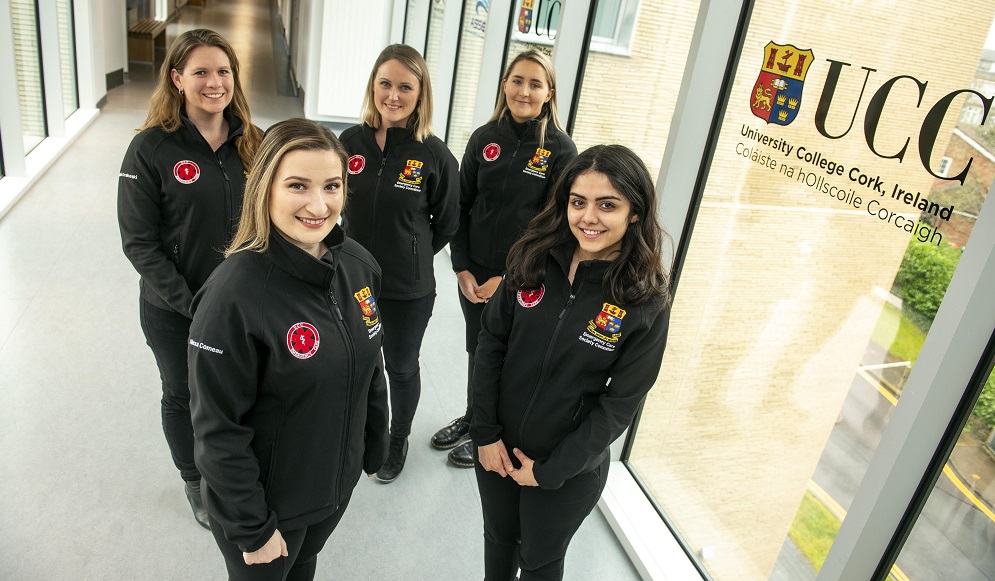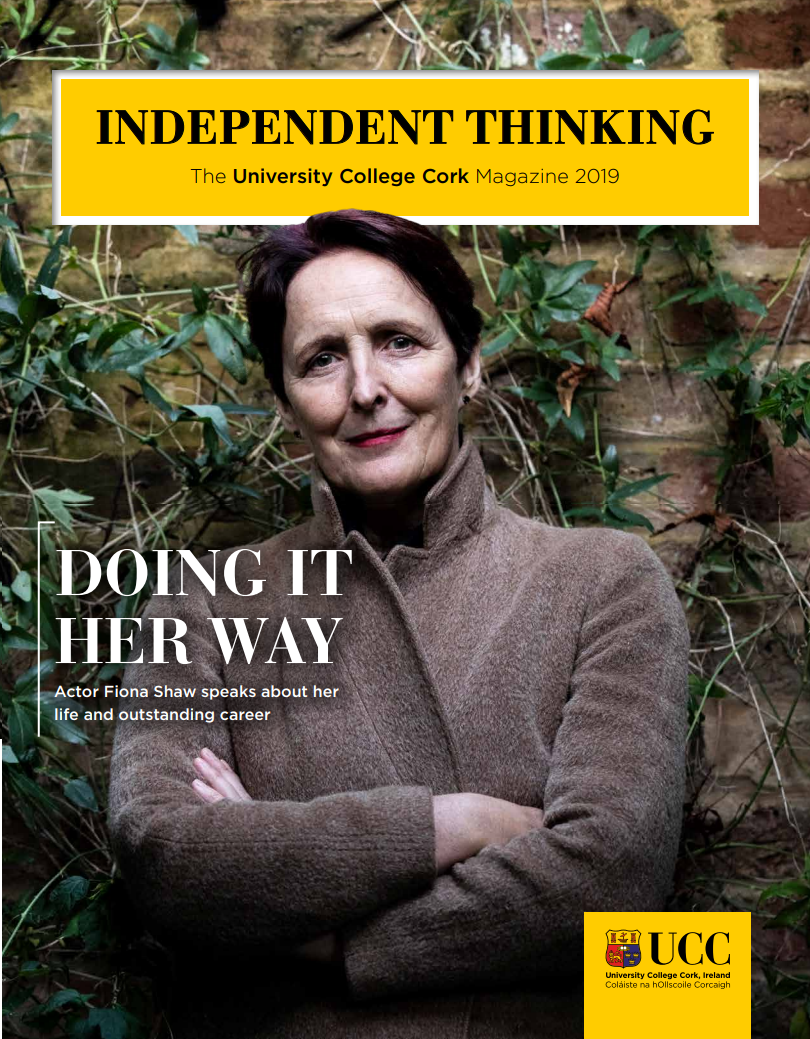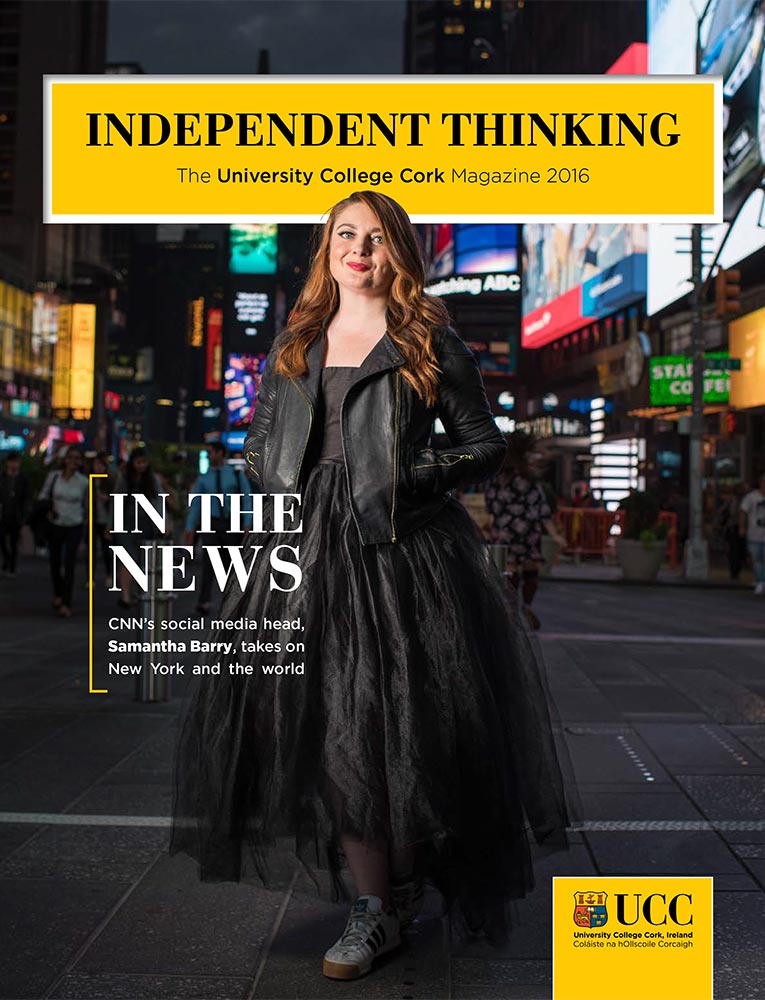Features
- UCC Springboard+: Kieran Egan
- UCC’s new Hub serves as ‘one-stop-shop’ service for 26,000 students
- Interview: Ryan Tubridy chats politics, history and his love of the arts on UCC visit
- UCC Emergency Care Society gets hands-on with life-saving skills
- Fitzgibbon Cup glory for UCC as hurlers beat IT Carlow in thrilling final
- GatewayUCC bridging the gap for research-entrepreneurs
- Pocket-sized brain injury monitor could be a game-changer for infant health
- Future of Irish hockey in safe hands with rising star Hannah
- Dr Eithne Hunt: Healthy habits for body and mind
- From Architecture to Web Development
- Nine APC Microbiome researchers make prestigious ‘highly cited’ list
- UCC honours five exceptional alumni at annual awards ceremony
- UCC spotlights four of its brightest up-and-coming female career scientists
- Rich Ferrie leads an exciting new era for UCC Innovation
- UCC honours its graduates with the official naming of the Alumni Bridge
- New UCC series explains how university research impacts daily life
- UCC's rising sports stars presented with scholarships
- UCC ranked among top universities in Europe for teaching excellence
Times Higher Education Europe Teaching Rankings 2019
- UCC makes Green Flag history…again!
The first university in the world to be awarded a fourth Green Flag
- Blazing a trail
Professor Helen Whelton charts her path to success, from curious dentistry student to global award-winner
- A Summer’s Evening on the Quad hits the right note for Cork charities
The fundraising event is now in its 14th year
- A curious mind
Paul Ross on his love of science, his greatest moments of discovery, and the exciting next chapter at APC Microbiome Ireland
- Mind your microbiome: 9 ways to boost your gut health
In honour of World Microbiome Day
- UCC hosts top wind energy experts at Cork’s largest ever conference
Scientists and engineers gathered to discuss the future of renewable energy
- Lord David Puttnam makes a passionate case for careers in the arts
He features in the latest episode of UCC’s podcast, Plain Speaking
- Funding announced for UCC SFI Research Centres
- Beekeeping makes life sweeter for Cork kids
- Saving Ireland's seals with GPS
- UCC celebrates a stellar year in sport
- Tommy Fleming headlines A Summer's Evening on the Quad
Tickets available now
- UCC ranked as global leader for sustainable social and economic impact
Times Higher Education University Impact Rankings
- Former UCC President Michael Murphy becomes first ever Irish President of EUA
Professor Murphy served as UCC President for 10 years
- MaREI researcher returns from epic adventure in search of blue whales
Dr Ailbhe Kavanagh spent seven weeks in Antarctica
- Doireann Ní Ghríofa among six new members elected to Aosdána at UCC ceremony
Writer Doireann is a UCC alumna
- Former White House drug advisor goes 'inside America’s opioid crisis'
Keith Humphreys is the latest guest on UCC's official podcast, Plain Speaking
- UCC launches Sports Strategy
Pride on our chest, belief in our heart, sport in our bones.
- How Nicole Ryan is powering change after tragedy
Alex’s Adventure
- Brainwave ‘donation’ research offers promise for dementia treatment
Research and innovation
- Full-circle for Paul as UCC extends partnership with Cork City FC
A perfect match
- Praise for The Irish Revolution as 'Atlas' documentary airs on RTÉ
Atlas of the Irish Revolution
- Pastures new
UCC launches its Food Institute
- Making waves at MaREI
Ireland's National Ocean Test Facility opens
- Research spotlight: APC Microbiome Ireland
10 researchers among Highly Cited
- Spin-out success
Atlantia Food Clinical Trials expanding stateside
- Billy Morgan: Pride of Cork
Marking a decade of UCC Sigerson Cup football
- The future is bright for soccer's Captain Fantastic
Ciara McNamara
- The next phase for rugby's rising star
Jack O'Sullivan
- RTÉ to air 'Atlas' documentary
The next step for the Atlas of the Irish Revolution
- Top business talent share their secrets to success
CUBS Conference 2019
- Green roots and flying boots: Cork Chamber project showcases ‘future’ of Cork
Future Forms is part of Cork Chamber’s 200th anniversary celebrations
- CEO and camogie star Mary O'Connor is leading change for women in sport
Moving the goalposts
- Mary Robinson is the first guest on UCC’s new podcast
Plain Speaking is now available to stream
UCC Emergency Care Society gets hands-on with life-saving skills
Natalie Krakoski and Clara Steele share how UCC's Emergency Care Society has come to play an important role in training UCC’s future healthcare professionals outside of the lecture theatre

Natalie Krakoski remembers all too well the day she helped to save a woman’s life.
She was cycling home when she noticed an elderly woman who had fallen into the bushes.
“I realised that she was having a heart attack and needed immediate assistance,” recalls Natalie.
“Because of my training, I was able to recognise what was going on and was able to respond in a manner that altered the outcome of her situation.”
The training that UCC medical student Natalie is referring to, are the life-saving skills she has learned through being a member and co-chair of UCC’s Emergency Care Society (ECS).
The society was originally formed in 2016 by a group of medical students with an interest in emergency medicine, and ever since, ECS has come to play an important role in training UCC’s future healthcare professionals, outside of the lecture theatre.
“These training workshops help consolidate our medical training and respond in an effective manner within the community, if the situation were to present itself” – Natalie Krakoski
Founded on the basis that all those training to become qualified healthcare professionals will be faced with future emergencies, ECS organises practical training workshops that help UCC students to develop the necessary skills to deal with them. Even if students do not ultimately choose a career in emergency medicine, the experiences acquired through the society provide an excellent source of fundamental skills that can be applied to any other medical path.
The training is focused on teaching students to manage medical situations both in a pre-hospital setting within the community, and also when equipped with a team in a hospital setting.
The workshops and training events are very practical and academic-based, and are chosen to complement the curriculum at the School of Medicine. They cover a wide variety of areas; for instance, as part of their ‘Halloween Horror Nights’ workshop, members were talked through how to deal with scenarios such as cardiac arrest response, diabetic ketoacidosis, and burns and shock.
Wilderness medicine was the subject of a weekend-long training event organised by Wilderness Medicine Ireland last September, whereby society members trained in how to respond to medical issues in situations that arise outside, and out of reach of the city.
The society also arranged for the highly-regarded British group, Rapid Response Adventure Medicine, to deliver their first-ever training in Ireland. ECS members were trained in managing urban traumas such as road traffic accidents, nightlife emergencies, and remote wilderness medical emergencies.
Thank you to everyone who came out to our event “Extreme Environments” tonight! Special thanks to @profcusack @JeffreyMulcaire and Dr Micheal Sheehan for teaching us how to manage drowning, pulmonary oedema in altitude and burns! #simulation #emerg pic.twitter.com/I1cf7ADVkF
— UCC Emergency Care (@UCCEmergencySoc) January 22, 2019
“A lot of us have found that – in the position of medical student – when something happens, everyone looks to you. And while we’re in training, the technical training that we get in classes may not give us the experience that’s needed to react in a helpful manner, on the spot,” explains Natalie.
“So, these training workshops help consolidate our medical training and respond in an effective manner within the community, if the situation were to present itself.”
And so this has been the case, with several ECS members having found themselves in emergencies, where they had to put their training into action.
“A colleague was able to recognise a close relative of his, entering septic shock. Because of their training within the emergency simulation setting, they were able to recognise this and get this person to the hospital for immediate care,” says Natalie.
Natalie’s co-chair, medical student Clara Steele, adds that ECS also exposes students to specialty areas of medicine at an early stage in their training.
“Emergency medicine is a huge umbrella term for lots of different sub-specialties,” explains Clara. “It’s introducing students to those specialties early on and getting them performing practical skills in a safe and supportive environment.”
“We work closely with medical professionals from a variety of hospitals to bring the best training experiences to the students," she adds.
Natalie and Clara are keen to emphasise the support and help that ECS receives from the Cork medical community as well as UCC’s School of Medicine. This support, they say, enables ECS to provide the best training possible – something that’s clear from their back-to-back victories at the SimWars intervarsity competition over the past two years.
A highlight of the year for ECS, SimWars is a competition that brings together all six medical schools in Ireland for a simulation-based training event. Using medical equipment, mannequins and role players, and getting support from medical specialists from all over Cork, the students use this event as an opportunity to get comfortable with emergency situations.
While two victories in a row is a wonderful testament to the society’s capabilities, the significance of ECS’ success goes far beyond that.
“The benefit of this is, once we start clinical placements – and beyond that, we have had an extra bit of training and would feel more comfortable in these situations,” says Clara.
While ECS hopes to make it three-in-a-row at Sim Wars 2020, we can comfortably say that the future of emergency medicine in Cork is in safe hands.
Follow this link for more information about UCC Societies.



